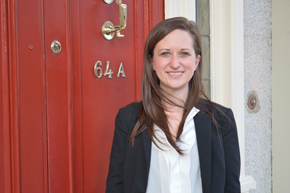September 24, 2018
Mercy Day
 Young Mercy Leaders' Pilgrimage -
Young Mercy Leaders' Pilgrimage -
A Participant's Diary
Molly Onufer
A Leader is a Dealer in Hope
Mary Reynolds rsm
This morning started off with a lovely morning prayer that began with a ceremonial setting of a tea set that set the tone of Catherine’s hospitality and prayers that welcomed the pilgrims to the spirit and presence of Mercy. The morning precession then led us into a thought-provoking keynote presentation from Sr Mary Reynolds, Executive Director of Mercy International Association, entitled ‘A Leader is a Dealer in Hope’.
Sr Mary started by proposing the idea: was our world ever in such need of hope? It was an idea that many of us would agree to be true. But, when we think about it, throughout history the world has always sought hope. I don’t know about anybody else, but I tend to look at problems in the world and be overwhelmed trying to figure out how we could possibly change an existing and engrained system. But Sr Mary offered a great definition of what it means to give hope – to look at life in a different way. You can break through impossibilities by looking at them differently.
Catherine McAuley did this when she looked at poverty and didn’t just see the rich are rich and the poor are poor, but she had a concern for the persons of the poor. How Catherine got things done was to believe in herself and what she was doing and put it all on the line. We have what it takes to repair the world – a fact that is simple and profound. But our generation faces the challenge of technology, which can sometimes draw us away from compassion – compassion is action. What we can bring to the world is a kind word, compassionate look and patient hearing of sorrows.
Sr Mary then went on to tell us a story about how we can have a profound impact on someone without recognizing it by doing even the smallest acts. This is what we can bring to leadership – it’s about the small acts. The effects of our actions can be huge. If we look at leadership and try to change the whole world all at once, we wouldn’t be able. BUT, if we start by being present and compassionate where we are – showing one person they are loved or have talents or can do something – we’re making differences that matter and can be further cultivated and contributed to progress.
During the Q&A, the participants shared Mercy projects they’ve been involved in with their universities and/or communities that reached out and built bridges with people. People are people are people, and building a relationship with people to let them know you care and believe in them is leadership. Most of our biggest affects come from the small moments of engagement and being present. Thus, we must be the light and show others’ their light as well. So, although Sr Mary pointed out that there’s no leadership handbook to follow, we can learn from Catherine’s advice to another sister: ‘Show kind affection every day.’
***
The World Needs Mercy...Can you respond? Karen Schneider RSM M.D.
Following on from her captivating keynote address, Karen Schneider RSM led a workshop on the topic of ‘The World Needs Mercy… Can you respond’ where she went into more depth of what global mercy is and how she has engaged it. Her journey began as a medical student when she wanted to travel and so consulted the Mercy global community to see if there were possibilities. She found an opportunity in Guyana and took it. After some experience negotiations and with unyielding courage, steadfast passion and a calling to help, she found herself in remote rural Guyana with sick people coming from all around to seek her help. Her very first spot in a lifelong, worldwide tour of medical service trips, she still visits that rural village in Guyana every year.
Karen’s stories are powerful, touching, adventurous, courageous, funny and hopeful. I think this is a tribute to herself and her leadership – that she can go to remote and/or disaster-stricken places – which are frankly, places most people would never go – and to discern so much from her experiences. They’re unconventional, technical, practical and sometimes there’s humor in them. I won’t go into summarising her stories now, because everyone should hear them firsthand, but… just wow.
So, here are some points I brought away from her workshop. First, I learned more about medicine and biology than I probably did in school. Secondly, I admire her approach to her residents’ experiences when they go on these trips with her. Some choose to pursue this course of medicine. Others don’t – but Karen pointed out that though fieldwork may not be for them, they will continue to be allies of the cause which is necessary for this sort of work to continue. Third being the importance and efficiency of the Mercy international connections. On the ground sisters have set up in these communities, which enables sisters like Karen to come in with services and additional supports. The last important point Karen left us with was: ‘It is for God we serve the poor and not for thanks.’
Messages to: Mary Kay Dobrovolny rsm